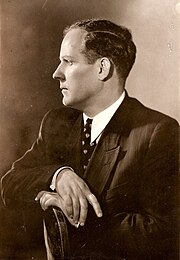Aleksandr Markevich
| Oleksandr Prokopovych Markevych | |
|---|---|
 |
|
| Born | 19 March 1905 Ploske, Kiev Governorate, Russian Empire) |
| Died | 23 April 1999 (aged 94) Kyiv, Ukraine |
| Alma mater | Kyiv University |
| Scientific career | |
| Fields | zoology, parasitology, carcinology, helminthology |
| Institutions |
Kyiv University, I. I. Schmalhausen Institute of Zoology |
| Doctoral advisor | Valentin Dogiel |
| Other academic advisors | Ivan Schmalhausen |
| Doctoral students | Vladislav Monchenko |
| Signature | |
 |
|
Oleksandr Prokopovych Markevych (Ukrainian: Олександр Прокопович Маркевич), in English more often Aleksandr Prokofyevich Markevich (Russian: Александр Прокофьевич Маркевич) (19 March 1905 – 23 April 1999) was a Ukrainian zoologist, and a prolific helminthologist and copepodologist. He was professor and an Academician of the Ukrainian Academy of Sciences.
Markevych was born 19 March 1905 in the village of Ploske, Kiev Governorate. His father Prokofiy Markevych served as a parish clerk in a rural church. His mother Maria Bordashevska came from a family of the impoverished nobility. During his studies at the Pedagogical Technical School (1921–1925) in Belaya Tserkov, he was engaged in research on ichthyology. He continued his studies at Kiev University, where he worked in the laboratory of I. I. Schmalhausen and simultaneously at the biological station of the Ukrainian Soviet Socialist Republic Academy of Sciences, situated on the Dnieper River.
His keen interest in fish parasites led him to work at the Ichthyological Institute of the Lenin All-Union Academy of Agricultural Sciences in Leningrad (now the Research Institute of the Lake and River Fish Industry), where he completed his post-graduate studies under the guidance of professor V. A. Dogiel. In the 1930s a team of scientists at the Laboratory of Fish Diseases, headed by Dogiel, laid the foundations of Soviet ichthyoparasitology. At this laboratory the young Markevich began to study the then little known and very complicated group Copepoda parasitica, with extraordinary diligence and perseverance. He studied the fauna of this group living in lakes Ladoga and Onega, in the Caspian and Azov seas and in a number of smaller water bodies.
...
Wikipedia
